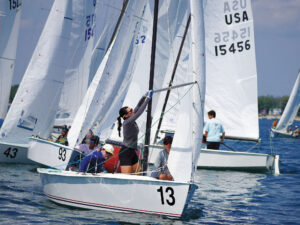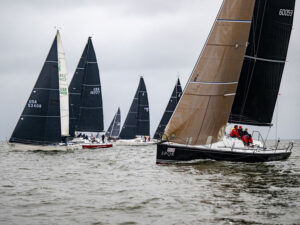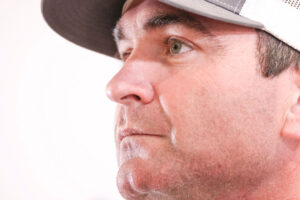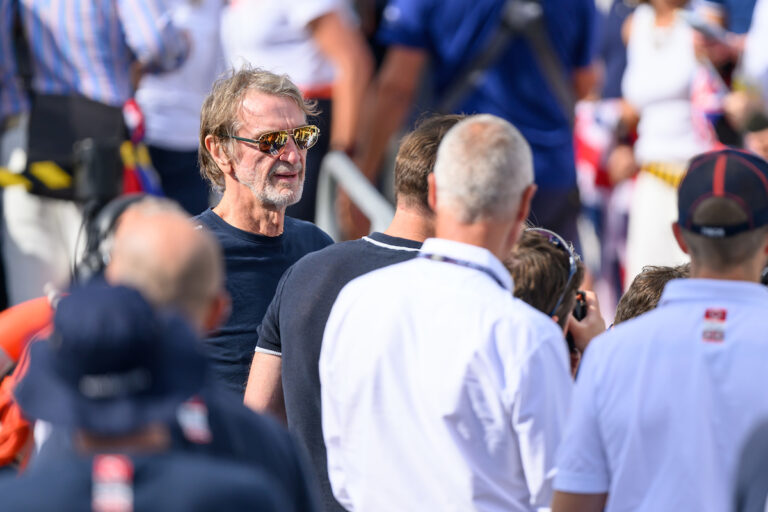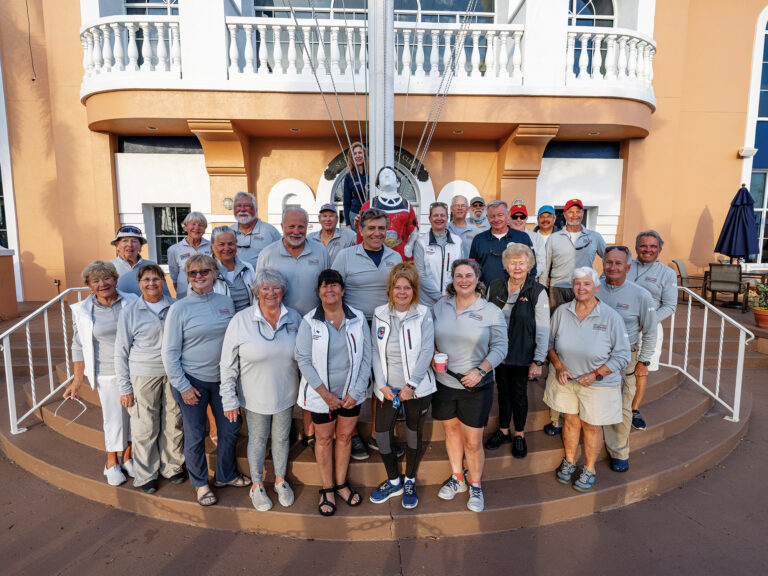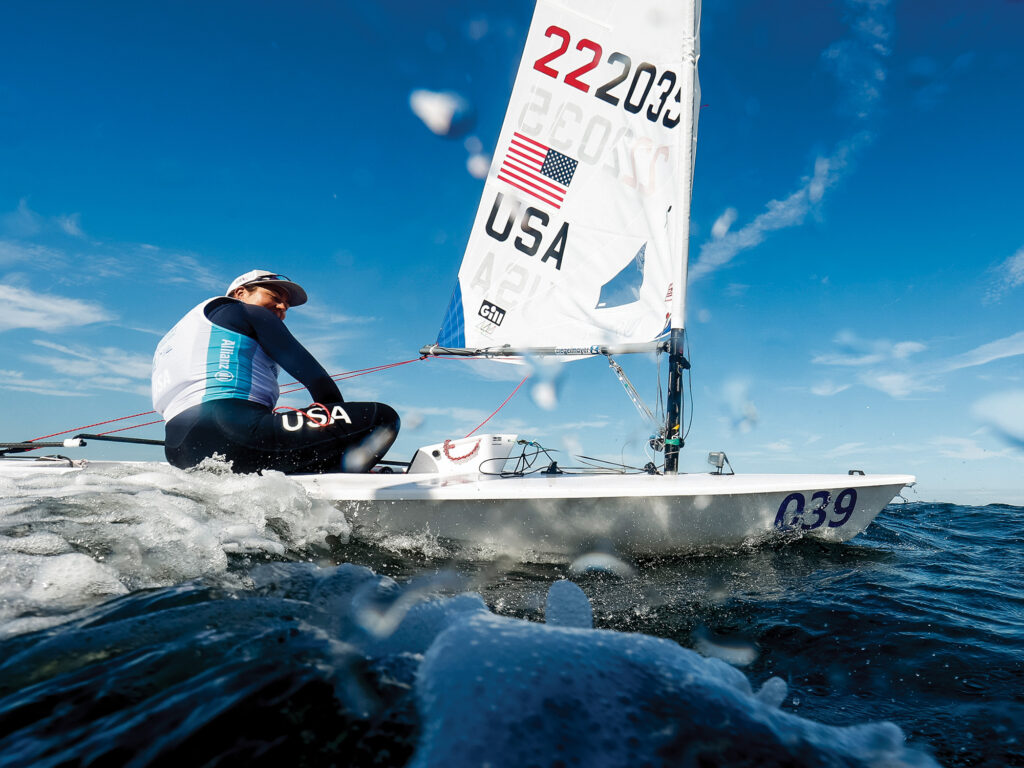
Since the ILCA 6’s (formerly the Laser Radial) addition to the Olympic Games in 2008, the class has remained the crucible of elite women’s singlehanded racing. Anna Tunnicliffe-Tobias, who won the first Radial gold medal in 2008, remains the only US Sailing Team athlete to reach the ILCA podium. With three-time Olympian Paige Railey bowing out of international ILCA competition after Tokyo, a strong squad of understudies has emerged from her shadow, including the talented 22-year-old Charlotte Rose, who has positioned herself as an heir apparent and a true contender for this summer’s Olympic Regatta. First, however, she must battle for the berth at the US team’s winner-goes trials in February.
Despite being one of the youngest top performers in the ILCA 6 class, Rose is no newcomer to championship sailing. Having campaigned full time for less than two years, Rose has made her presence known—qualifying the US for the 2024 Games by finishing fifth at the 2023 Allianz Sailing World Championships in August and recently posting a personal best with a silver medal at the ILCA 6 Women’s World Championship in January.
Growing up in Houston, Rose has held Olympic aspirations since childhood, fueled by an unquenchable ambition. “Even before I started sailing, I was always a competitive kid,” Rose says. “I remember watching the 2012 Olympics and seeing athletes like Michael Phelps and saying, ‘I want to be one of them one day.’”
A product of the learn-to-sail camp at Houston YC, Rose began racing the ILCA at age 13, joined the US Olympic Development Program at 15, and quickly ascended the ranks of the youth sailing circuit. After competing in international events during her high school years, Rose made her big break when she won back-to-back gold medals at the Youth Sailing World Championships in 2017 and 2018.
“Before 2017, I was never winning national or North American titles, so I had no expectation of being selected for the Youth Worlds,” Rose says. “Winning in 2017 and again closer to home in 2018 are definitely the two events I am most proud of.”
While continuing to campaign, Rose also sailed at Jacksonville University, where Head Coach Jon Faudree says that she displayed incredible levels of talent and dedication. “Charlotte has an elite-athlete drive that goes above and beyond the average person, whether that be in the gym, studying, or just being able to sail the number of days she does,” Faudree says. “Her drive to just get up and do it over and over again was very impressive. The vast majority of us burn out after spending that much time on the water, so I think that her ability to maintain a high level of competitiveness is what makes her an elite athlete. And it shows in her results in heavy air. If it gets above 12 knots, she’s unbeatable.”
While Rose’s work ethic and ambitions make her a force to be reckoned with on the water, overcoming the expectations she places on herself as she competes in an incredibly unforgiving fleet has been one of her greatest challenges.
“When I first started campaigning, my outlook was very results-based, and I put a lot of pressure on myself to be perfect,” Rose says. “I’ve been working with my coach, Alex Saldanha, on how we communicate with each other on the water, figuring out what type of information I like and not picking apart too much about what happened [when debriefing on the water between races].”
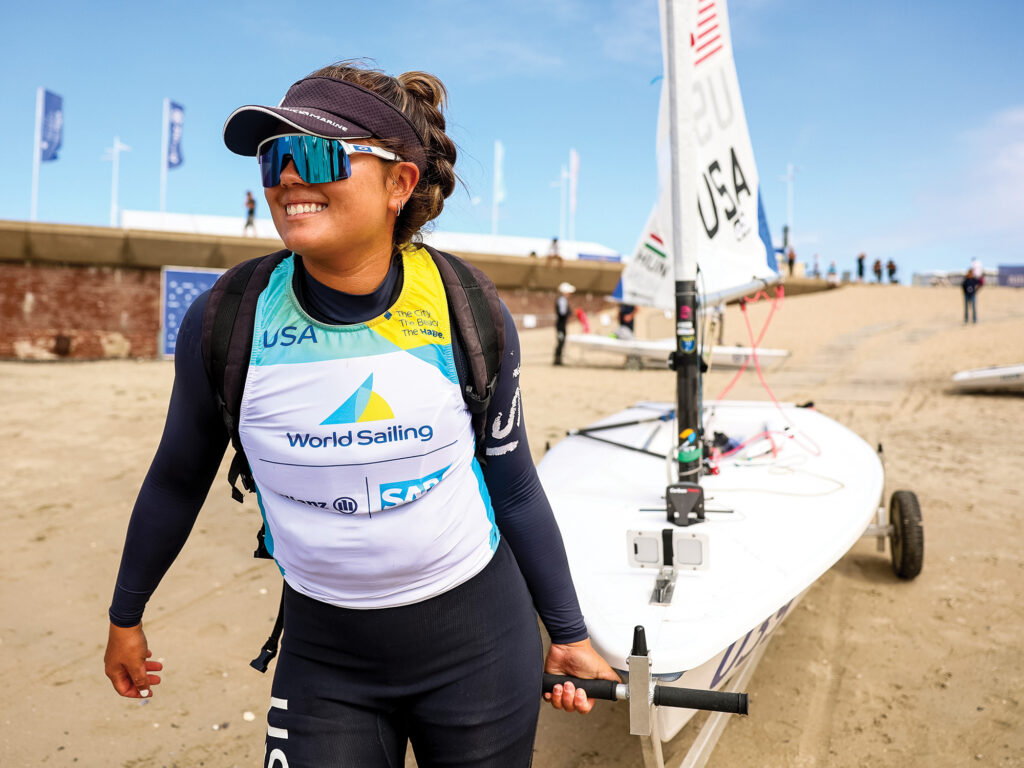
Breaking out of an all-or-nothing mentality during racing has allowed her to further dial in her renowned skills in heavy air. “I think that a lot of people, in heavy air, think that they need to hike at 100 percent all the time. Then they go down to 50 percent when they get tired,” Rose says. “I’ve been working on conditioning myself to stay at a certain percent a lot of the time, maybe 80 percent, so I can keep moving. Having consistency in the heavy wind really helps me maintain energy for a longer period.”
While some experts believe that modern-day Olympic athletes are better served deferring college, Rose utilized her time at Jacksonville to further develop a championship mentality and a better understanding of the variables she can control on the racecourse. “We talked a lot about failure and how to accept it, learn from it, and move on more quickly,” Faudree says. “In this sport, there are so many variables that are out of your control, so we focused on how to move on when something like that happens. Putting bad situations behind you is really difficult for elite sailors to do; you work so much more than everybody else, so when things go wrong, it is tough to handle when you have that much drive.”
Beyond refining her mental game, Rose says that her experience sailing in collegiate venues has served her well. “At the Worlds in August, we had a bunch of current, and I sailed on a river that had a bunch of current in college, so I had that in my toolbox going,” Rose says. “Even though it’s a completely different type of sailing, I knew how current worked and where to put myself on the course. That’s something Coach Faudree taught me well.”
As the Olympic Trials draw closer, Rose has stepped up her game on the racecourse—and has the results to prove it. After finishing second at the ILCA Worlds, just over a month before the trials, she now feels that she has the skillset required to qualify for the Games.
US Sailing Team Laser Radial/ILCA Olympic Past Results
- Tokyo 2020: Paige Railey (37)
- Rio 2016: Paige Railey (10)
- London 2012: Paige Railey (8)
- Beijing 2008: Anna Tunnicliffe (Gold)
“I didn’t feel a lot of pressure going into this year’s world championship because we’d already qualified the country for the Games, so I just wanted to practice my routine and practice how I’m going to go into the trials,” Rose says. “I was focusing on controlling what I can control and thinking about my performance race by race. I felt really good in my fitness and my sailing. It doesn’t feel real that I finished second at a world championship. I feel super motivated and very confident.”
With the opportunity to achieve her lifelong Olympic dream within reach, Rose says that the feeling is surreal. “I’m definitely feeling nerves and think that this is going to be the hardest regatta of my life,” Rose says. “It’s crazy to think that this is the pinnacle of my career, but I’m just going back to focusing on myself and knowing that this is what I need to do.”
Facing off against 21 of America’s top ILCA 6 sailors in a nine-day competition is a far departure from the normal format of big-fleet international ILCA racing, and will require Rose and all others to be able to put it all on the table throughout a brutal marathon regatta.
“The smaller fleet will mean that getting good starts and keeping speed up will be very important,” Rose says. “It’s going to be a really long week, and that will definitely get to everyone’s head. I think my mindset for the trials is that whoever is able to keep their head on straight for the longest and keep it cool will probably win.”
A ticket to Paris is the ultimate goal, of course, but Rose, 22, has plenty more years to hone her power and poise. Should she come up short in Miami in February, there’s Los Angeles in 2028—a tidy two decades removed from Tunnicliffe’s podium glory.

